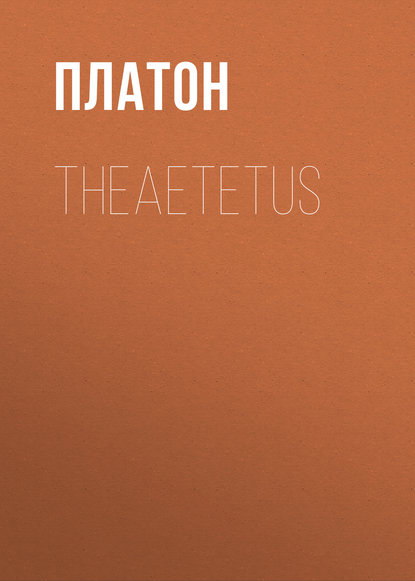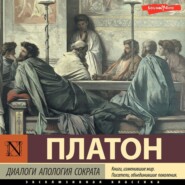По всем вопросам обращайтесь на: info@litportal.ru
(©) 2003-2024.
✖
Theaetetus
Настройки чтения
Размер шрифта
Высота строк
Поля
SOCRATES: And the number of each is the parts of each?
THEAETETUS: Exactly.
SOCRATES: Then as many things as have parts are made up of parts?
THEAETETUS: Clearly.
SOCRATES: But all the parts are admitted to be the all, if the entire number is the all?
THEAETETUS: True.
SOCRATES: Then the whole is not made up of parts, for it would be the all, if consisting of all the parts?
THEAETETUS: That is the inference.
SOCRATES: But is a part a part of anything but the whole?
THEAETETUS: Yes, of the all.
SOCRATES: You make a valiant defence, Theaetetus. And yet is not the all that of which nothing is wanting?
THEAETETUS: Certainly.
SOCRATES: And is not a whole likewise that from which nothing is absent? but that from which anything is absent is neither a whole nor all; – if wanting in anything, both equally lose their entirety of nature.
THEAETETUS: I now think that there is no difference between a whole and all.
SOCRATES: But were we not saying that when a thing has parts, all the parts will be a whole and all?
THEAETETUS: Certainly.
SOCRATES: Then, as I was saying before, must not the alternative be that either the syllable is not the letters, and then the letters are not parts of the syllable, or that the syllable will be the same with the letters, and will therefore be equally known with them?
THEAETETUS: You are right.
SOCRATES: And, in order to avoid this, we suppose it to be different from them?
THEAETETUS: Yes.
SOCRATES: But if letters are not parts of syllables, can you tell me of any other parts of syllables, which are not letters?
THEAETETUS: No, indeed, Socrates; for if I admit the existence of parts in a syllable, it would be ridiculous in me to give up letters and seek for other parts.
SOCRATES: Quite true, Theaetetus, and therefore, according to our present view, a syllable must surely be some indivisible form?
THEAETETUS: True.
SOCRATES: But do you remember, my friend, that only a little while ago we admitted and approved the statement, that of the first elements out of which all other things are compounded there could be no definition, because each of them when taken by itself is uncompounded; nor can one rightly attribute to them the words 'being' or 'this,' because they are alien and inappropriate words, and for this reason the letters or elements were indefinable and unknown?
THEAETETUS: I remember.
SOCRATES: And is not this also the reason why they are simple and indivisible? I can see no other.
THEAETETUS: No other reason can be given.
SOCRATES: Then is not the syllable in the same case as the elements or letters, if it has no parts and is one form?
THEAETETUS: To be sure.
SOCRATES: If, then, a syllable is a whole, and has many parts or letters, the letters as well as the syllable must be intelligible and expressible, since all the parts are acknowledged to be the same as the whole?
THEAETETUS: True.
SOCRATES: But if it be one and indivisible, then the syllables and the letters are alike undefined and unknown, and for the same reason?
THEAETETUS: I cannot deny that.
SOCRATES: We cannot, therefore, agree in the opinion of him who says that the syllable can be known and expressed, but not the letters.
THEAETETUS: Certainly not; if we may trust the argument.
SOCRATES: Well, but will you not be equally inclined to disagree with him, when you remember your own experience in learning to read?
THEAETETUS: What experience?
SOCRATES: Why, that in learning you were kept trying to distinguish the separate letters both by the eye and by the ear, in order that, when you heard them spoken or saw them written, you might not be confused by their position.
THEAETETUS: Very true.
SOCRATES: And is the education of the harp-player complete unless he can tell what string answers to a particular note; the notes, as every one would allow, are the elements or letters of music?
THEAETETUS: Exactly.
SOCRATES: Then, if we argue from the letters and syllables which we know to other simples and compounds, we shall say that the letters or simple elements as a class are much more certainly known than the syllables, and much more indispensable to a perfect knowledge of any subject; and if some one says that the syllable is known and the letter unknown, we shall consider that either intentionally or unintentionally he is talking nonsense?
THEAETETUS: Exactly.
SOCRATES: And there might be given other proofs of this belief, if I am not mistaken. But do not let us in looking for them lose sight of the question before us, which is the meaning of the statement, that right opinion with rational definition or explanation is the most perfect form of knowledge.
THEAETETUS: We must not.
SOCRATES: Well, and what is the meaning of the term 'explanation'? I think that we have a choice of three meanings.
THEAETETUS: What are they?
SOCRATES: In the first place, the meaning may be, manifesting one's thought by the voice with verbs and nouns, imaging an opinion in the stream which flows from the lips, as in a mirror or water. Does not explanation appear to be of this nature?
THEAETETUS: Certainly; he who so manifests his thought, is said to explain himself.

















